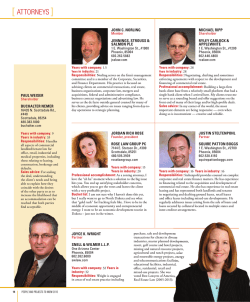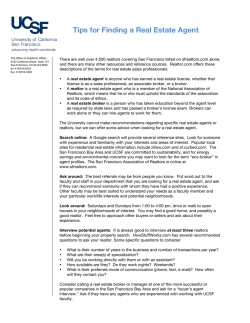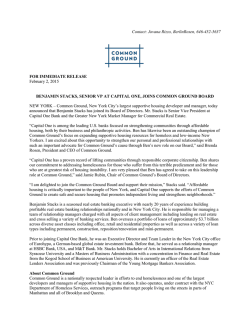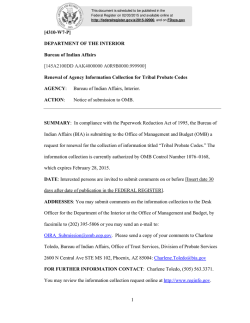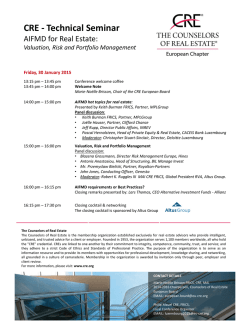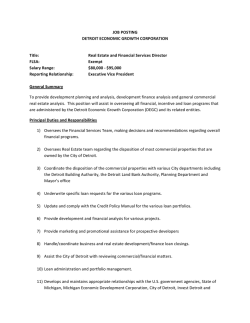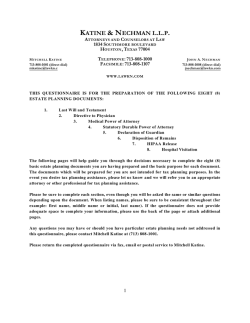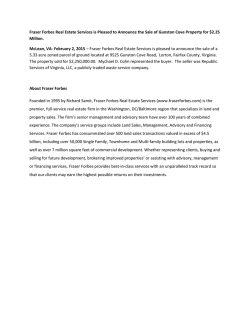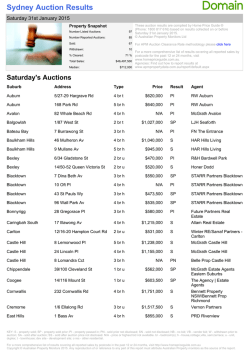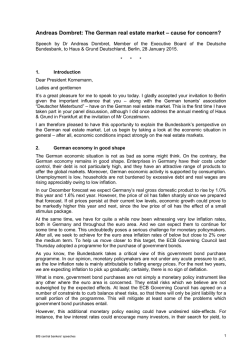
Picking your Personal Representative
Picking your Personal Representative Find out what is takes to wind up a decedent’s estate & how to select the right person for the job. © 090814 Monica Haven, E.A. The information contained herein is for educational use only & should not be construed as tax, financial, or legal advice. Each individual’s situation is unique & may require specialized treatment. It is, therefore, imperative that you consult with tax & legal professionals prior to implementation of any strategies discussed. Fiduciary = Executor, Administrator, Trustee, Successor Trustee, Personal Representative Make burial, cremation & memorial arrangements Post an announcement in the obituary section of the local paper [optional] Relieve caretakers & nursing aides Select a charity (or charities) to allow others to make memorial contributions Request certified Death Certificates [suggested amount: 10] Apply for Employer Identification Number [Form SS-4] & notify IRS of fiduciary relationship [Form 56] Open estate (trust) checking account Pay decedent’s debts & obligations, notify creditors & settle claims Notify Social Security Administration (800/772-1213) & refund any benefits received for the month of death File claims for life insurance benefits, retirement, pension & annuity accounts Notify financial institutions of death, provide new EIN, request allocated 1099s at year-end Locate will, codicils &/or trust document Open Probate within 30 days after death & receive Letters Testamentary or Letters of Administration Inventory all personal & financial assets – separate assets into probate & non-probate assets Manage property during probate period; sell or dispose of assets as needed Pay any gifts or charitable contributions specified in the will or trust File all requisite tax returns o Payroll tax returns for wages paid to caretakers prior to death o Issue & file requisite informational returns, including 1099s to attorney & fiduciary o Income tax returns: Pre- & post-death [Forms 1040 & 1041] o Gift tax returns for all previously unreported & year-of-death gifts [Form 709] o Estate tax return due 9 months after death if estate in excess of roughly $5 million [Form 706] o Make all required estimated tax payments o Notify IRS that the fiduciary relationship is terminated [Form 56] Account to & distribute the remaining assets to the heirs & beneficiaries Close estate after final payment of any tax liability, expenses & distributions Monica Haven, E.A., J.D., L.L.M. 1534 South Edris Drive * Los Angeles, CA 90035 * (310) 286-9161 * FAX (310) 557-1626 * e-mail: [email protected] Recommendations – not all suggestions are applicable in all situations Obtain (historical) real property appraisals from a qualified appraiser [not realtor] Ask securities broker to provide date of death values, accrued interest & dividend amounts Obtain asset valuations for date of death & alternate valuation date (6 months after DoD) EVP Systems, Inc. (818) 313-6300 http://www.evpsys.com/ Do NOT distribute all assets – withhold sufficient funds from beneficiaries to cover potential liabilities & tax assessments Transfer residual assets into a non-interest bearing account during final year of estate administration to avoid need for filing another tax return Request prompt assessment under to shorten statute of limitations from 3 years to 18 months [Form 4810] Request discharge from personal liability or personal representative when estate/trust is closed [Form 5495] Make incremental & considered decisions – take your time! Planning Ahead – making things easier for the personal representative Select a fiduciary who is organized & has the ability to delegate tasks to individuals with the appropriate levels of experience & knowledge Avoid naming co-trustees whenever possible to minimize the eventual need for excessive communications & deferred decision-making. Appoint at least 2 or 3 successor representatives; generally individuals who are younger than you Make sure that fiduciary will be adequately compensated – it is not an “honor” to be appointed! Trustee fees typically range between 0.5 & 2% of assets under management Court-mandated executor fees range from 0.5 to 4% of the probate estate Keep all pertinent documents neatly organized & readily accessible Write a personal letter of instruction specifying any items not otherwise addressed within the legal paperwork Beware of potential gift tax consequences when establishing joint tenancies & co-ownership of financial assets If you want estate to claim a charitable deduction, make sure donation to qualified organization is specified in will or trust – no deduction allowed if discretion regarding amount or donee organization is given to beneficiary Establish sub-trust or UTMA funding for under-age or financially irresponsible beneficiaries Understand that even trust disputes will end up in Probate Court Monica Haven, E.A., J.D., L.L.M. 1534 South Edris Drive * Los Angeles, CA 90035 * (310) 286-9161 * FAX (310) 557-1626 * e-mail: [email protected]
© Copyright 2026


